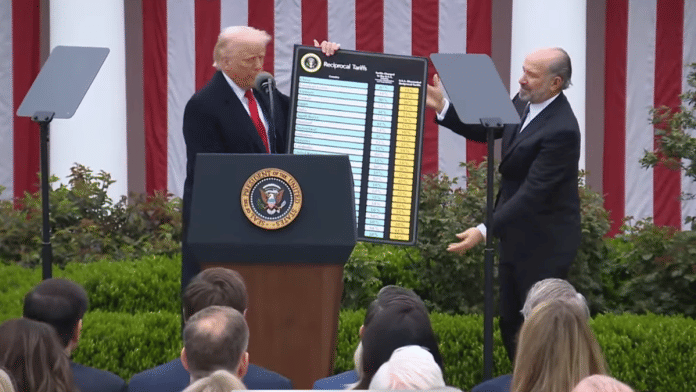New Delhi: The Trump administration has defended its right to presidential tariff powers by citing the use of trade incentives to stop armed hostilities between India and Pakistan post Operation Sindoor among others.
This submission made to a federal court in New York comes even as the Ministry of External Affairs (MEA) has rejected Trump’s claim on the India-Pakistan ceasefire, asserting that the decision to halt hostilities followed the military action that compelled Islamabad to stand down.
President Donald Trump leveraged US trade access as a bargaining tool to help “avert a full-scale war between India and Pakistan,” Trump’s officials told the federal court.
The assertion, included in a May 23 declaration by the US Commerce Secretary Howard W. Lutnick, was submitted to the US Court of International Trade as part of a broader defense of the Trump administration’s sweeping tariff policies. It is the first time such a claim, previously made only in public speeches and social media posts by Trump, has been formally entered into the legal record.
These legal filings are from four Trump administration officials opposing a lawsuit brought by small businesses. The suit challenges the blanket 10 percent tariffs on most imports, as well as additional country-specific duties. The case is currently being heard by the US Court of International Trade, which handles disputes related to trade and customs law.
A top aide of Trump has further claimed that it was steep tariffs on China that persuaded Beijing to lower levies on American goods.
The filing argues that the president’s authority under the International Emergency Economic Powers Act (IEEPA) is vital to U.S. foreign policy and global security.
“Such measures signal to foreign governments that certain conduct whether economic predation, trade manipulation, or narcotics trafficking will incur serious consequences,” Lutnick wrote. He warned that a court decision curbing that authority could have “ripple effects across every domain in which economic instruments are used for strategic effect.”
Lutnick then cited the recent India-Pakistan military escalation, claiming that Trump’s intervention through trade diplomacy helped de-escalate the crisis.
“For example, India and Pakistan—two nuclear powers engaged in combat operations just 13 days ago—reached a tenuous ceasefire on May 10, 2025. This ceasefire was only achieved after President Trump intervened and offered both nations trading access with the United States to avert a full-scale war,” the legal statement reads.
“An invalidation of President Trump’s ability to use IEEPA would dismantle a cornerstone of President Trump’s national security architecture, irreparably harm the government’s ability to respond to evolving foreign threats, and severely disrupt the Department of Commerce’s coordination of foreign policy-related economic actions on behalf of the President,” it further added.
Trump was the first to announce a cessation of India-Pakistan hostilities on 10 May, declaring on social media that the US had helped broker peace. India has denied these claims and maintained that cessation of hostilities were mutually agreed upon bilaterally.
A day later, he posted on Truth Social: “While not even discussed, I am going to increase trade, substantially, with both of these great Nations.”
In a meeting with South African President Cyril Ramaphosa on 22 May, Trump yet again brought up the recent ceasefire between India and Pakistan, claiming he had “settled” it.
However, Indian officials have strongly denied that trade played any role in ending the hostilities.
In a rare move, even Indian officials publicly released details of high-level contacts with US counterparts, emphasizing the absence of any trade discussion. According to these disclosures, US Vice President J.D. Vance spoke to Prime Minister Narendra Modi on May 9, and Secretary of State Marco Rubio spoke to the Indian External Affairs Minister and the National Security Adviser on multiple occasions between May 8 and 10.
“From the time Operation Sindoor commenced on 7th May, till the understanding on cessation of firing and military action on 10th May, there were conversations between Indian and US leaders on the evolving military situation. The issue of trade did not come up in any of these discussions,” MEA spokesperson Randhir Jaiswal said at a 13 May press briefing.
(Edited by Tony Rai)
Also Read: Hints of thaw in US-China tariff war—as Trump says duties to ‘come down’, China open to talks






